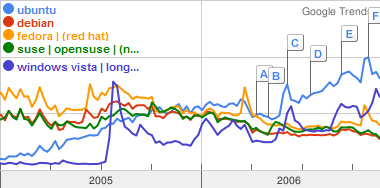
I was just playing around with Google Trends and I thought of showing the result of one of my search.
You can see on the figure (or directly at Google Trends) the evolution of search request perform by users of the Google web search engine in 2005 and 2006.
At the beginning of 2005, Ubuntu was rather new, hence the growing number of request over 2005 and 2006. I have no explanation about the sudden rise of Vista in the beginning of the second 2005 semester.
So was Ubuntu more popular than Vista in 2006? Well if by just using Google Trends we would have such an answer that would be easy, but this is only one factor amongst many. So you can think of your own good idea.
To conclude, you could check this other trend comparison between various version of Ubuntu, interesting…


 I have been writing a small guide on
I have been writing a small guide on  Translating a software is not a piece of cake. I have started doing some translation for the Ubuntu project, from English to French. And sometimes it is requiring a lot of effort to translate a single word just because usually the text you are reviewing is seen raw: out of the context, and thus many translation could apply but only one is correct. I did not give too much thought on this, and I move on.
Translating a software is not a piece of cake. I have started doing some translation for the Ubuntu project, from English to French. And sometimes it is requiring a lot of effort to translate a single word just because usually the text you are reviewing is seen raw: out of the context, and thus many translation could apply but only one is correct. I did not give too much thought on this, and I move on. Ubuntu is ready for network operations just after install. But what about easy configuration when you are on the go, like being able to select your wireless network, handling its security or viewing in real time its quality?
Ubuntu is ready for network operations just after install. But what about easy configuration when you are on the go, like being able to select your wireless network, handling its security or viewing in real time its quality?
 I have found a little tiny utility that simply and neatly displays the CPU and hard disk temperatures: the
I have found a little tiny utility that simply and neatly displays the CPU and hard disk temperatures: the